Grandad Len - Soldier of the Forgotten Army
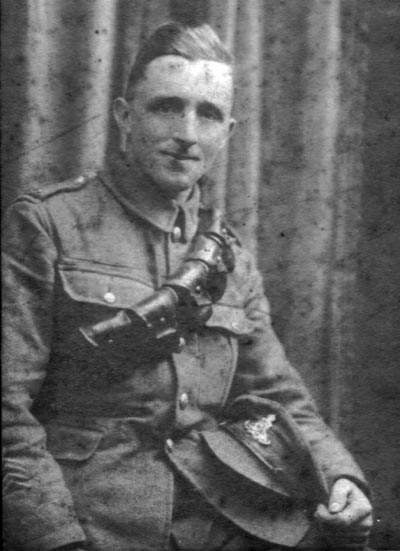
When I was a child I often pressed Grandad to tell me about his time in the army during the Great War. Like so many old soldiers, he usually headed me off. I guess he didn't really want to think about it. He told one amusing story about a mule kicking a bad-tempered NCO off the quay and into the sea, but that is all I can remember.
When I started looking at my family's history I tried to find Len's service record. Two-thirds of the soldiers' records from the Great War were destroyed during the blitz of 1940, so I wasn't surprised when I failed to find anything. After some further searching, I found a record of the medals which he had been awarded; This showed that he had served as a driver in the Royal Field Artillery and had the regimental number 94152. He had first entered active service in France on the 7th of September, 1915, so he was a volunteer, entitled to the 15 star as well as the Victory and British War medals.
As an artillery driver, Grandad would have been responsible for leading a pair of the horses or mules which pulled the guns and delivered ammunition and other supplies. Unfortunately the fact that Grandad had served in the RFA didn't tell me anything about where he had served and what he was likely to have experienced. For that I needed the information from his service record.
So the matter rested for several years. During the build up to the centenary of the outbreak of the war I wrote an article about another Great War soldier - one whose records had survived. Knowing his details, I was able to consult his regimental war diary which gave a day by day account of their activity. If only I knew Grandad's unit. I wondered if this information might be recorded elsewhere. I now had his regimental number so I tried searching for that in the online indexes. Bingo! - there were Len's records misfiled under the wrong name!
Grandad enlisted at Southend on the 13th February, 1915. He gave his age as twenty years and four months and his trade as butcher. He was appointed to the Royal Field Artillery, part of the Royal Regiment of Artillery. Two days later he arrived at Maryhill, Glasgow for basic training.
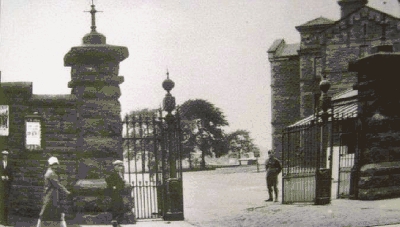
The entrance to Maryhill barracks photographed in the 1920s
Like many new recruits, Len had himself photographed; he sent a copy as a postcard to his brother Charles in Liverpool:
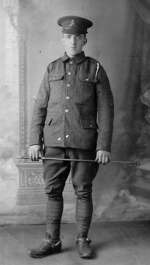
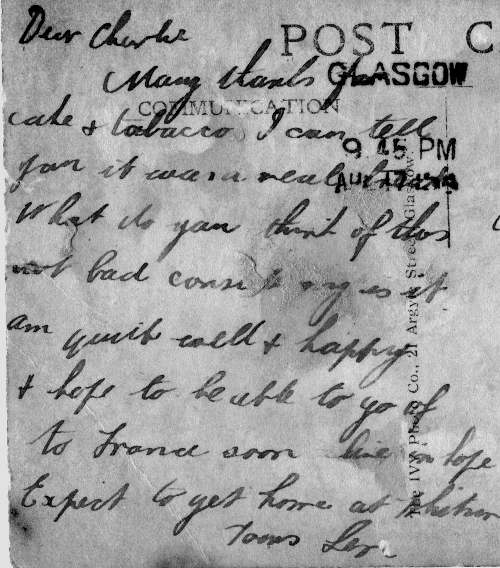
Dear Charlie, Many thanks for the cake and tobacco. I can tell you it was a real treat. What do you think of this not bad considering is it. [I] am quite well & happy & hope to be able to go of to France soon live in hope. Expect to get home at Whitsun. Yours Len.
The picture shows a rather awkward looking young man in the uniform of a RFA driver: spurs, riding breeches, riding whip and long puttees laced at the top. Compare this with the photo at the top of the page which was taken a few months later in Southend, probably just before leaving for France.
After three months basic training, Len was posted to the Reserve Brigade for specialist training before being sent to his first active unit - the 22nd divisional ammunition column - on the 15th of July. The 22nd was a new division formed as part of Kitchener's Third New Army. Its artillery units were being assembled at Lewes in Sussex prior to going to France. Len was able to visit home on several occasions - we know this because his record shows that he was punished twice for overstaying his leave.
On the 6th of September, 1915, Len left Southampton for France. The division was moved to Flesselles, on the outskirts of Amiens - probably being held in reserve for the Battle of Loos - however its stay in France ended before it saw battle. In October Bulgaria entered the war on the side of the Germans and the 22nd Division was moved to northern Greece as part of a force to support the Serbian army. Len was transported by train to Marseilles - probably sharing a cattle waggon with the mules or horses for which he was responsible. At Marseilles he embarked on a troop ship for Greece - a journey which took ten days as the ship had to follow a course to minimise the risk from enemy submarines. Conditions on board ship were terrible: the men were seasick and the confined animals stank. Len was no doubt relieved when he arrived in Salonika (now Thessaloniki) on the 29th of November, 1915.
Salonika is a large town in the North of Greece. Until 1912 it had been part of the Turkish Empire. Len arrived just as the troops sent earlier to support the Serbian army were defeated and driven back to the border North of the town. The next few months were spent building a defensive line in the hills to the North to protect Salonika from invasion. Len would have spent most of his time transporting tools, barbed wire and ammunition from supply dumps in Salonika to the infantry in the hills.
Like many soldiers, Len took a while to acclimatise to conditions in Greece. Less than a month after arriving he was confined to hospital for a week with diarrohea. At the end of March, 1916, he was in hospital again - this time for a week with scabies.
The details of activities on the Macedonian Front are recorded in detail elsewhere. I am still trying to piece together Len's part in them. As a driver in the 22nd divisional ammunition column I think he would have spent most of his time delivering materiel from the base in Salonika to dumps closer to the front. The 22nd Division took part in the Battle for Horseshoe Hill (10-18 August, 1916) and the Battle of Machukovo (13-14 September). Grandad was probably involved in delivering the ammunition for these battles.
In November 1916, Len was transferred to 101st brigade, RFA. This would have brought him much closer to the enemy. He probably spent most of his time collecting supplies from the forward dumps and delivering them to the guns at the front. This often had to be done in daylight in sight of the enemy who, naturally, tried to disrupt the process. As part of the 22nd Division's artillery, the 101st brigade would have taken part in the three battles of Doiran (24-25 April and 8-9 May 1917 and 18-19 September 1918).
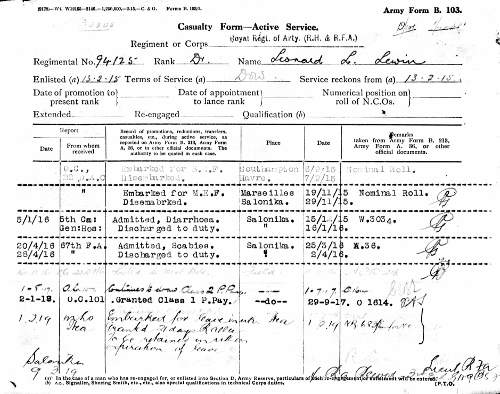
Len embarked for leave in England on 1st of February, 1919. He was discharged from the army at Purfleet, Essex, on 17th April. He had been a soldier for just over four years.